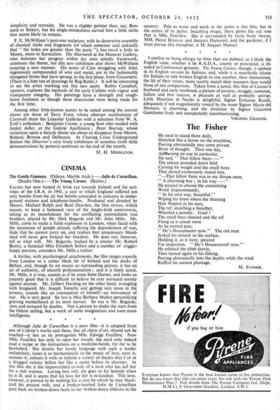CINEMA
The Gentle Gunman. (Odeon, Marble Arch.)—Julie de Carneilhan. (Studio One.)—The Young Caruso. (Rialto.) EALING has now turned its brisk eye towards Ireland and the acti- vities of the I.R.A. in 1941, a year in which England suffered not only bombs from the air but bombs concealed in suitcases in under- ground stations and telephone-booths. Produced and directed by Messrs. Michael Relph and Basil Dearden, the film strives, within reason, to keep a balanced view of the Anglo-Irish controversy, taking as its mouthpieces for the conflicting nationalisms two brothers, played by Mr. Dirk Bogarde and Mr. John Mills. Mr. Mills, come to make a futile explosion in London, when faced with the innocence of people already suffering. the depredations of war, finds that he cannot carry on, and realises that unnecessary blood- shed will never give Ireland her freedom. He does not, however, tell us what will. Mr. Bogarde, backed by a sinister Mr. Robert Beatty, a fanatical Miss Elizabeth Sellars and a number of trigger- happy patriots, considers Mr. Mills a traitor.
A thriller, with psychological attachments, the film ranges expertly from London to a rather bleak bit of Ireland and the docks of Belfast, and, though by no means an outstanding picture, it has an air of authority, of smooth professionalism - and it is finely acted. Mr. Mills, it is true, sounds as if he came from Dorset, and looks so patently good that it is difficult to believe he ever nurtured enmity against anyone. Mr. Gilbert Harding on the other hand, wrangling with brogueish Mr. Joseph Tomelty and getting very cross in the process, sounds like an extenuation of himself—an instrument of war. He is very good. So too is Miss Barbara Mullen personifying grieving motherhood at its most eternal. So too is Mr. Bogarde, torn and tortured by doubts. Not a picture to shake the stars from the Odeon ceiling, but a work of some imagination and even-more intelligence.
Although Julie de Carneilhan is a-poor film—it is adapted from
one of Colette's works and these, like all objets d'art, should not be touched—it has as its protagonist Mlle. Edwige Feuillere. Now Mlle. Feuillere has only to open her mouth, she need only indeed read a recipe or the instructions on a medicine-bottle, for me to be bewitched. She invests her lovely language with such a tender melancholy, tunes it so harmoniously to the music of love, coos it, caresses it, colours it with so infinite a variety of shades that I sit in a drugged ecstasy before her like a snake before its charmer. In this film she is the impoverished ex-wife of a man whO has left her for a rich woman. Loving him still, she goes to his bedside when he is ill, and it seems that his love for her is re-kindled. This love, however, is proved to be nothing but a ruse by which he may black- mail his present wife, and a broken-hearted Julie de Carneilhan goes back on broken-down heels to her broken-down château in the country. Pale as water and weak at the joints is this film, but in the centre of its pallor, breathing magic, there glows the red rose that is Mlle. Feuillere. She is surrounded by fairly lively thorns, MM. Pierre Brasseur and Jacques Dumesnil, and the gardener, if I must pursue this metaphor, is M. Jacques Manuel.
• a
I confess to being allergic to films that are dubbed, as I think the English voice, whether it be R.A.D.A., county or provincial, is ill- suited to Continental gestures. The Young Caruso, though, is spoken in its English version by Italians, and, while it is manifestly idiotic for Italians to talk broken English to one another, their intonations, the lilt of their voices, more readily match their manners than would those of our compatriots. Taken from a novel, this film of Caruso's boyhood and early manhood, a picture of poverty, struggle, romance, failure and first success, is pleasant as well as probably untrue. Little Maurizio di Nardo is delightful, Signor Ermanne Randi, adequately if not magnificently voiced by the tenor Signor Mario del Monaco, is charming, and the direction by Signor Giacomo Gentilomo lively and unexpectedly unembarrassing.
VIRGINIA GRAHAM.


































 Previous page
Previous page